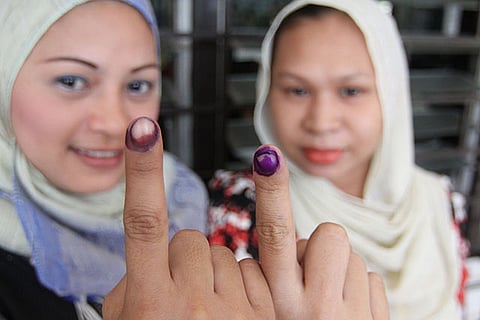
- NEWS
- the EDIT
- COMMENTARY
- BUSINESS
- LIFE
- SHOW
- ACTION
- GLOBAL GOALS
- SNAPS
- DYARYO TIRADA
- MORE

As millions of Filipinos cast their votes in the 2025 midterm elections, early signs pointed to a shift in political dynamics and public priorities — a break from the polarized atmosphere of the 2022 national elections.
This year’s elections were happening at a volatile time in Philippine politics.
The once-solid alliance between President Ferdinand Marcos Jr. and Vice President Sara Duterte had crumbled, leading to a highly charged political feud.
Former President Rodrigo Duterte is facing trial at the International Criminal Court over his controversial war on drugs, and his daughter is gearing up for an impeachment trial in the Senate.
Against this backdrop, over 18,000 national and local positions were up for grabs, for the Senate to city councils. Voters across the country showed up in large numbers. While official turnout figures were still being counted, analysts suggested they could match, even exceed, the record 83.07 percent turnout in 2022.
This election had a different feel from 2022. Back then, it was all about political personalities and historical narratives, but this time voters focused more on the issues.
A survey by Social Weather Stations (SWS) in April found that 75 percent of voters wanted candidates who would stand firm on the Philippines’ rights in the West Philippine Sea — shifting away from the traditional focus on family names and slogans.
At presstime, the Commission on Elections (Comelec) had reported fewer machine malfunctions compared to 2022, when technical issues caused major delays and frustration. Improvements in logistics, tech support, and machine maintenance made the voting experience smoother in most precincts.
But some issues still persisted, including ballot secrecy problems, where voters’ choices were visible as they fed their ballots into the vote-counting machines. There were also reports of voter confusion and isolated incidents of disinformation and red-tagging in certain hotspots.
Comelec Chair George Garcia acknowledged the challenges but highlighted the improvements made since the last election.
Despite regulations on campaign spending, experts said enforcement remained weak.
Much like in 2022, most campaign spending happened before the official campaign period, exploiting legal loopholes and undermining spending limits.
The Comelec’s Campaign Finance Office still lacks the resources and power to properly investigate or sanction violators.
The elections also showed a shift in political loyalties, especially in regions like Mindanao and the Visayas, once strongholds of the Duterte family.
The fallout between the Marcos and Duterte families has reshaped alliances at both the national and local levels.
The 2025 elections may be remembered as a turning point — where a maturing electorate, tired of political theatrics and disinformation, began demanding clearer platforms and more accountable leadership.
As the dust settles, the question now is whether the newly elected leaders will rise to meet the growing expectations of a public eager to move beyond old narratives and embrace a more issue-focused, accountable democracy.
